Job Search
Tinies has hundreds of childcare jobs across the UK
Our Favourite Key Stages in Child Development
Tinies Education Special: All children grow and develop in their own way, in their own time. Play and time spent is serious business to help them learn, so never underestimate its influence on your child's development!
The development of your child is fascinating. To think you can encourage this through play and interaction is well worth the time invested - it will pay dividends in terms of the social, physical and intellectual development of your baby right through to their school years and beyond.
Every child is different
All babies grow and develop in their own way, in their own time. We asked childcare expert Margaret McMenemy to give us the lowdown on the key stages, and how to maximise your child's learning potential when they are aged:
Key development stage: birth to one
Language development in children
Language development can start very early as young babies begin to copy your sounds and speech pattern. You may feel silly speaking to your baby as you are out with the buggy, pointing things out, but it will reward you when your child starts to speak:
'By the time a child is 3 years old, a fast learner may use at least 600 words and even slow talkers will probably know at least 350 words.' (Tessa Livingstone, Child of Our Time)
Key tips for developing language
1) Talk, talk, talk: A quiet household generally makes a quiet child, so get that conversation going!
2) Get reading: Books are a great way to encourage a love of reading from a very early age. Young babies love textured books, bath books, material books and rhymes. Pop up and counting books are also a hit with young children.
3) Turn the TV off: Young children have a short concentration span, so turn the TV off. They shouldn't be distracted by other noises while you are reading to them.
Encouraging movement
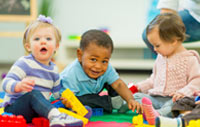 Many babies find music soothing and some show particular interest in certain kinds which may settle them at night or at sleep times. Encourage your baby to move their arms and legs for physical development, on a play mat, bouncy chair, in the bath. Babies love bubbles, and splashing in the water is a fun game.
Many babies find music soothing and some show particular interest in certain kinds which may settle them at night or at sleep times. Encourage your baby to move their arms and legs for physical development, on a play mat, bouncy chair, in the bath. Babies love bubbles, and splashing in the water is a fun game.
Around the five months mark, your baby may decide to roll off his or her play mat (aren't they clever!) but beware, as they may not be where you left them. Bottom shuffling and crawling are all part of their development as they approach their first birthday, or some babies prefer to walk round furniture until they're trotting off on their own.
Key tips for encouraging movement
1) Make sure your baby is safe by removing furniture with hard edges.
2) Push-along toys can help children to be confident walkers and toy brick building will help their manual dexterity. Give them sultanas or other small, healthy snacks and watch them use their pincer grip.
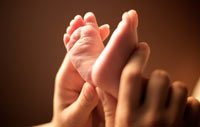
3) Tune into your child's personality: Some love rough and tumble games, while others are quieter in their behaviour. They will tell you when they like the game.
4) Most importantly, have fun with your child! Sometimes the simplest games can make them roar with laughter e.g. throwing a soft toy in the air and catching it. If you laugh they will laugh and imitate your expressions.
Playing games babies love
All children love peek-a-boo games as they realise you don't disappear but 'boo' back, to their surprise! Traditional games and stories are still are hit, such as 'This Little Piggy' and 'Round and Round the Garden'.
Now is also a great time to introduce simple jigsaws and puzzles, shape sorters, along with sound and light books - all toys that little ones will love.
Key development stage: two to three years old
Writing and drawing
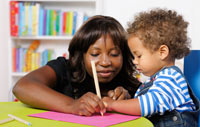 As your child approaches two years old, introduce more materials to write and draw with. An easel is a good buy and will encourage a love of drawing. Summer outdoors is always better for painting two year olds, but in the winter, clear a space if you can and use newspaper on the floor... you'll be glad you did.
As your child approaches two years old, introduce more materials to write and draw with. An easel is a good buy and will encourage a love of drawing. Summer outdoors is always better for painting two year olds, but in the winter, clear a space if you can and use newspaper on the floor... you'll be glad you did.
Emotional and behavioural development
No child is perfect and sometimes their emotions can be overwhelming at this age when they are trying to express themselves with limited language skills.
Independence is a great quality in your child, unless they're insisting on dressing themselves (which might be taking longer than you both imagined) and you're already running late!
Key tips for handling emotions and behaviour
1) Turn getting dressed into a game. It's a great tactic, although you might feel like rushing them into the car with their pyjamas on (you wouldn't be the first parent!).
2) Plenty of praise on what they are getting right is always the way to go, and allow plenty of time if you can.
 3) Children can be very funny at this age, but remember: if you don't want your child to repeat something, don't say it in their company. It will only be regurgitated in the most inappropriate place - queuing at the bank, for example - "Mummy says - Blah!"
3) Children can be very funny at this age, but remember: if you don't want your child to repeat something, don't say it in their company. It will only be regurgitated in the most inappropriate place - queuing at the bank, for example - "Mummy says - Blah!"
This is also the beginning of pretend play, and children love to dress up just as much as we love to take photographs of them.
Key development stage: three to four years old
Walking and running
At three years old, they will be walking and running confidently, may walk on tip toes, and jump from small steps. They love playing with a ball and can peddle and steer a tricycle as practise for cycling when slightly older.
Music will be a good tool to help your children to practise movement and dance.
Learning through play
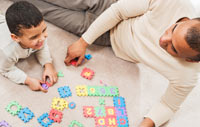 Your child can draw a face and may use their preferred hand. Their vocabulary is increasing, starting to use symbols e.g. stick becomes a wand. Can string beads and colour match. They may like instruments and simple sharing games.
Your child can draw a face and may use their preferred hand. Their vocabulary is increasing, starting to use symbols e.g. stick becomes a wand. Can string beads and colour match. They may like instruments and simple sharing games.
They may find going to nursery fun, but they may still play alone and be quite possessive of toys.
Counting should be encouraged and you can make this fun with colourful books, counting sheep and cows as you pass fields, trees... anything you like!
As they reach four years old, children will increasingly play with other children in a group; they will take turns and share, and they like to be helpful and show affection. They are becoming more independent but may still need reassurance.
Key tips for encouraging learning through play
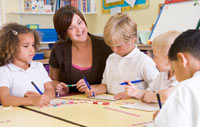
1) Continue to play with your child: Junk modelling will be fun at this age.
2) 'I spy', 'The Minister's Cat' and so on are all games children love as their vocabulary increases.
3) Activities should be used to develop attention and memory. Note that as children are showing an interest in how things work, they may appear destructive.
This is an important year for a child as they will be starting school; the love of books and language you have instilled will go a long way to helping them with this transition.
